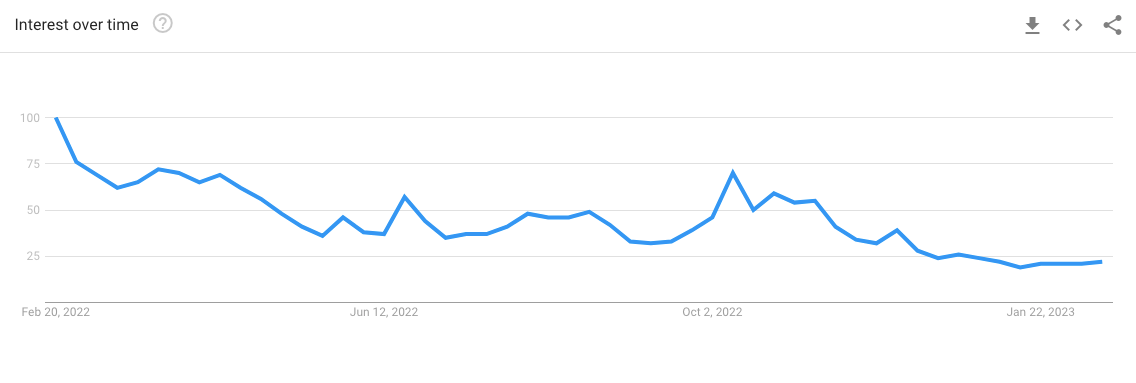Google Bard + 230, Crazy Sydney, Metaverse Meh

Will GPT-Search Get Sued?
We've written before about the upcoming SCOTUS case Gonzalez v. Google. The central question is whether algorithmic recommendations are entitled to protection under Section 230 of the Communications Decency Act, which shields publishers from liability for third party content on their platforms. Google and its peers are very concerned about the case and its potential impact on their businesses. SCOTUS likely wouldn't have taken the case unless it was seeking to clarify the scope of Section 230. The issue isn't a neatly ideological one, so it's difficult to predict how the current court will rule. But it is likely to change or narrow Section 230 immunity. Google says that reducing liability protections will paradoxically cause more censorship and more "objectionable content." An interesting new wrinkle is: how might a more narrow Section 230 impact AI-enhanced search or content generated by AI tools such as Google Bard?

Our take:
- Links to third party content trigger Section 230 protections for search engines/social sites. But complete "answers" without citations might not.
- Inaccurate AI content or disinformation that users detrimentally rely upon or that results in some sort of IRL harm could generate lawsuits.
- SCOTUS may not explicitly consider how Section 230 changes might impact AI content, but they would affect it for sure.
Open the Pod Bay Doors, Sydney
The BingGPT backlash is now in full swing. After the largely positive response to BingGPT's beta launch a week ago, a second wave of public reactions is skewing negative. NY Times columnist Kevin Roose said his two-hour discussion with BingGPT left him "deeply unsettled." Other reports have called BingGPT and its alter-ego Sydney "creepy," "threatening" and "unhinged." In a blog post, Microsoft defended itself and called BingGPT a work in progress, putting a mostly positive spin on early responses. The company added that "millions" of people are now on the waiting list and reported, "71% of [beta testers are] giving [it] a 'thumbs up.'" Despite the dystopian critiques, there are multiple indications more people want to try BingGPT, as well as the Edge browser. This is a major brand and PR coup for Microsoft.
Our take:
- Any search quality gap between Bing and Google is probably relatively small now. Google usage is largely habitual at this point.
- Surveys (here, here) suggest people will try BingGPT. If they like it, some of them will defect to Bing or at least use it periodically.
- Microsoft has flipped the script. Once the "evil empire," Microsoft is now the underdog, while Google is in the role of complacent monopolist.
State of the Meh-taverse
According to multiple reports, Apple will formally announce its mixed reality (AR/VR) headset at its June developer conference, WWDC. It's rumored to cost ~$3K, although Apple is working on less expensive designs. The company has been developing AR/VR glasses for years and has hundreds of people on the project, run by former Dolby executive Mike Rockwell. Apple has probably spent billions on salaries and prototypes. Yet the project will likely turn out to be a major disappointment. Metaverse hype is in decline and now totally eclipsed by AI. As a directional reflection of public interest, search queries for "metaverse" have been trending down. And while VR gaming and virtual worlds such as Minecraft and Roblox are doing fairly well, most people aren't that excited (conflicting survey results: here, here). Though Apple's products often command higher prices, the company has badly miscalculated with a $3K price tag. Even Meta itself is partly backing away from its supposed raison d'être.

Our take:
- Microsoft effectively killed Hololens, its AR/VR glasses, with recent layoffs. And Google has backed away from VR hardware.
- In the near term, VR will largely remain a gaming phenomenon -- though B2B, shopping and education could see some gains.
- The problem is the headset: cost, comfort, style. AR will continue to gain adoption, but VR faces a much steeper climb.
Short Takes
- Why AI + search could be good for (lower-funnel) SEO.
- YextChat: Will it become the product Answers was meant to be?
- Google offers "Link Best Practices" guide.
- Snap introduces tool to make AR product images look more realistic.
- The EU may block the Adobe takeover of competitor Figma.
- Growth of Twitter alternatives appears to be over.
- OpenAI GPT tech may soon draft contracts and legal briefs.
- Google: everyone needs to give 2 - 4 hours to improving Bard.
- Foot traffic up at luxe dept. stores though not at the mid-tier.
- Shopify revenue growth slowed dramatically year over year.
- DoorDash is doing suprisingly well.
- Super Bowl half-time performance has worked well for Rihanna.
Content created entirely by human beings.
Listen to our latest podcast.

How can we make this better? Email us with suggestions and recommendations.

